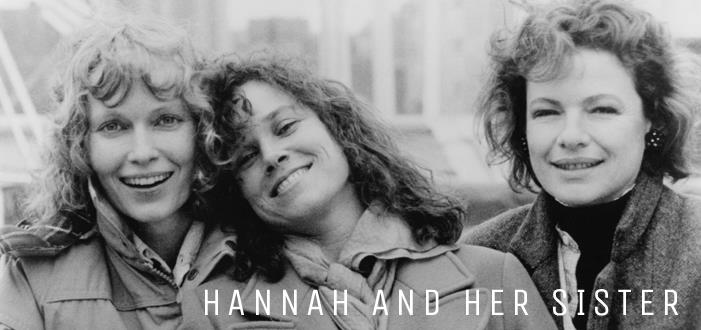
Hannah and her Sister
Consider this the apex of Woody Allen’s philosophical meditation on being. And due to Hannah and her Sister’s mid-80’s completion, this might have been the turning point for the filmmaker, as this crescendo has clearly not been matched in any of his later works. It is the stark confrontation of the absurd by an uneasy and timid individual, who becomes queasy rather invigorated at the challenge. Mr. Allen discloses this secret nervousness through his surrogate character in the film, who ostensibly is only loosely attached to the main plot, but upon further investigation acts chorally to reinforce the main plot’s central movement. And that movement is that one should act how one feels like in a meaningless world, irrespective of anything outside of oneself.
I could not help but find the thesis central to Mr. Allen’s own life. This is to say, the moral nihilism championed in the film is something Mr. Allen himself advocates, crudely because any notion of sacrifice is not worth while because one will never see the results come to fruition. Enjoy it while you can is his answer to the absurd, which to be fair is something that is open to interpretation among the Existentialists. Mr. Allen would of course be appropriated as one delivering is own answer, which is more or less to behave like an animal – as that, on its basest level, is the activity of doing what one pleases.
There is this connotation of pleasure and emotional behavior that is sound, because ultimately it makes furtive that one is being controlled through one’s physiological impulses and not something more uniquely and subjectively human; that is one’s mind. This of course since the Ancients is the delineation between man and animal, but now in this age of nihilism, people find transcendence to be a convenient abstraction to direct their lives towards something which does not cause them anxiety attacks. It is, more or less to Mr. Allen, a contrivance to give them peace of mind about their ultimate end: death. And since that is the ultimate end, whether one is pious or wicked, because there is no reward nor punishment for being either, than one ought to get away with as much one possibly can.
The amusing characteristic about human beings is that they must continually re-learn the lessons of old. Plato proudly extinguished the character of Glaucon who arrived at the same mode of living in his Republic. The meditation on the idea of justice is ultimately more essentially a meditation on the ideal, that which is necessarily supra-phenomenal to human experience yet is taken to exist. Such supernaturalism, i.e. transcendence, is taken to be simply an idea itself now. And at the very least in the decadent New York culture of the mid-80’s where people form bonds now and act as beings to simply pass the time.
The drama, in other words, in Hannah and Her Sisters, is really only stirred because of the meaninglessness in the life of the instigator. He is married to Hannah yet craves her sister and cannot control himself because he has no obligation to. Not to his beloved, not to God, not to anyone present, nor anyone past, nor anyone future. Patently such caprice is uncivilized; it does not lead to what causes civilization’s to decline. Because such decision-making never has a concern for the immemorial, which is the world-to-come.

